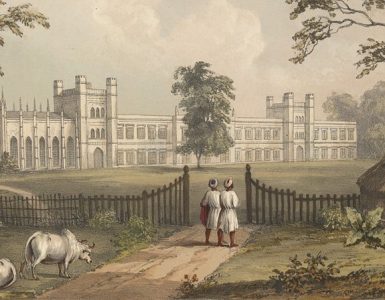My Experiences in Life (2 incidents)
Jayanta Majumdar, 1963 Metallurgical Engineering
A Little Girl, And A Rabbit from Heaven.
It was the year, to the best of my memory, 1980. I was working with Industrial Cables (India) Limited (a public limited company controlled by the DLF family), at an interior place near the unknown village Julana in Jind district, Haryana. It was about 120 km from Delhi (Cannaught Place). The group had a power cable factory at Rajpura, Punjab and steelworks and transmission tower factories at Jind district Haryana. Later on, I managed the whole company as its President.
Our small family of myself with my sweetest lady-wife Indira, and the two daughters of just six (Tinku) and five years (Tumpa), were living in the campus of about 200 acres. Those were not the days of Tech-kids or IT-kids. The kids were much simpler in habits, if we compare with today. So, our two darling daughters were grown up in a semi-urban environment with their natural childish simplicity. (Let me add, many urban facilities were indeed available for us).
The campus had our factory, a residential colony with well cultivated orchards around, a thickly wooded area, and a barren patch of land where only wild bushes could grow, thin and thick, with varities of shorts and talls. I was told that there were wild rabbits in those bushes, but during my years of stay in the campus I could never spot any. Rather, I could find a wide range of unknown beautiful small birds having their nests in those bushes.
One evening myself and Indira were on our dinner table. Our two daughters already had their meals and had gone to bed. That time, we heard the sound of a few gun shots, coming not from far. We had number of security guards in the campus, all ex-soldiers and some of them possessing their licensed weapons. I remarked to Indira rather loudly – Oh, it must be the same Sultan Singh, trying to shoot innocent rabbits on the sly in the darkness. (Sultan Singh was our Assistant Security officer, and on that very day I have noticed him cleaning his double barrel gun at his post of duty).
Our younger daughter Tumpa was in deep sleep. But the elder one, Tinku, was still awake on her bed and she could hear my remark. She rushes in and pleads, “Daddy daddy, show us the rabbits please. Let’s go in the morning. Please daddy, please”. I became alarmed. I knew there were absolutely no rabbits in those thorny bushes to show to our daughters and so, the little girls would be terribly disappointed. Fortunately, Tumpa was then asleep and could not hear our conversation. So, Indira strikes a deal — that on coming Sunday morning the father will accompany Tinku to the bushes only if Tinku keeps quiet and does not share the plan with her younger sister. Indira did not want that after a wild goose (rabbit) chase in the morning, we have not one but two disappointed little girls to console; one would be enough.
So, on the said Sunday morning, after a quick breakfast, we dodge Tumpa and set out for our venture of rabbit spotting, on foot, holding each other’s hand. Could notice the excitement of adventure in my innocent child’s face, and the sweet smile.
The spot was not far away. A flat topography with a bush here, and a bush there. I picked up a dry piece of wood to use as a stick. We approached the first bush and stir it with the stick, awaiting some response, or some reaction or noise. Nothing happens. Then we moved to the second bush and again poke the stick inside. Incidentally, some rustles now, but no rabbit and a pair of small birds felt disturdeb with our actions and flew away. I am watching my daughter. Now there is someanxiety on her innocent face, and I get alarmed.
Over the next about 20 minutes, we probed all the bushes in that damned field there, with no rabbit showing up to oblige my little daughter. By this time, she has fallen silent, her shoulders have dropped, her smile disappeared, AND there are hints of tears from the corner of her eyes.
Oh, one bush is still left for us! The last one— a little further away from us, that was almost at the end of our fenced campus. Now I am praying hard – “Oh God; please please help a poor father; please do some miracle and wipe off the tears from the eyes of an innocent child; please do something NOW”. I took a glance at Tinku. She was watching her father with a puzzled look.
I again hold her hand and marched to our final post- the last bush standing there. I asked Tinku to go around that bush and wait on the other side. I told her – “Baby, I will shake this bush now and you stay alert. A rabbit will come out and you can have a close look.” She runs for her post, excited that she will finally find her rabbit.
I again pray to God for a miracle, by dropping a rabbit from the heaven, if required, into this bush. Then I took a deep breath, a couple of firm steps forward and vigorously stir the bush. My girl I can not see— her small frame obscured by the bush.
Nothing happens for a l-o-n-g few minutes. Then I heard a rustling sound from somewhere in the dry leaves on the bush bed and then I cold hear my little girl suddenly giggling and clapping her hands and chanting …….. Rabbit Rabbit Rabbit Rabbit. I briskly went around the bush and could find a huge brown rabbit, majestically jumping away from us and towards the fence. It briefly stops near the fence, sitting on its two hind legs and cast a final glance back at us, as if to say good bye.
I look back to my daughter; there is a beaming smile on her face now, although the tears are still there in the corner of her eyes. We, the happy father and daughter dou now proudly marched back home hand in hand.
Even today, I believe it was a miracle. God can even drop a rabbit from the heaven into a bush on our earth just to wipe off a child’s tears.
That small girl Tinku is now a big lady, and a Singer too, living in America.
 (A father’s birthday gift for his loving daughter).
(A father’s birthday gift for his loving daughter).
Kishen Our Houseboy, and the Police Thanedar
Again, the stage is set in rural Haryana- the heart of India’s Jaatland. We had a factory and a residential colony with quarters for the managers and staff.
Kishen was our house boy, only 14 years old but already a 6 feet tall giant; very simple but incredibly a funny character that can easily be a case-study example of any psychologist. His father was the Sarpanch (village head) of a nearby village, and on his requeste, we engaged Kishen as our domestic help. The boy stopped going to the school and became a headache to his parents.
Our local Thanedar (Station House Officer, or SHO as the term commonly used in Haryana) was from Hissar area and a formidable policeman. Since I was heading a factory unit of five hundred employees, therefore strategically I had to maintain a rapport with the area Thanedar.
Kishen used to help Indira for a few hours a day, mostly in cleaning and gardening. But everyday his unexpected simple but destructive acts in variety of forms annoyed Indira, and she becomes desparate in keeping herself cool. The beauty was, Kishen would immediately admit his misdeeds with pride when confronted. For example, Kishen would break the glass crockery while cleaning. And if Indira asks, “Yeh tor diya?”, he immediately responds “Ha Maa-ji, tor diya”. Next day again he breaks the glass into three pieces. “Kya Kishan? Yeh bhi tor diya?”.
– Ha Maa-ji, yeh bhi tor diya.
It reminds me the famous poem by of Rabindranath Thakur. His পুরাতন ভৃত্য (The Old Servant) breaks the utensils into three pieces.
তিনখানা দিলে একখানা রাখে, বাকি কোথা নাহি জানে;
একখানা দিলে নিমেষ ফেলিতে তিনখানা করে আনে।
(If we give him three, he can keep only one, and won’t remember where are the other two. And if we give him one, he will break it into three).
Incidentally Rabindrnath’s that servant was Keshta, and ours was Kishen. So, it is possible that our Kishen was a reincarnation of Rabindrantha’s Keshta ……and like him র্নিবোধ অতি ঘোর
বড় প্রয়োজন, ডাকি প্রাণপণ চিৎকার করি ‘কেষ্টা’—
যত করি তাড়া নাহি পাই সাড়া, খুঁজে ফিরি সারা দেশটা।
So, our Kishen was an innocent with dirty hands, and had no shame or regrtes for his misdeeds.
ঘরের কর্ত্রী রুক্ষ মূর্তি বলে, “আর পারি নাকো,
রহিল তোমার এ ঘর-দুয়ার, কেষ্টারে লয়ে থাকো।
না মানে শাসন বসন বাসন অশন আসন যত
কেথায় কী গেল, শুধু টাকাগুলো যেতেছ জলের মত।
**********
প্রসন্ন মুখ, নাহি কোন দুখ, অতি অকাতর চিত্ত!
ছাড়লে না ছাড়ে, কী কিরব তারে— মোর পুরাতন ভৃত্য!
Mr. Sangwan was our company’s personnel manager, a middle aged local Jaat and an experienced professional. A fortnight after when Kishen was working (!) with us, Sangwan enters my office and requests that Kishen should be released by Mrs Mazumdar for a few hours as Sangwan HAS TO take him to the police station for questioning. He also briefed that there is a written complaint against Kishen by their neighbour that during a quarrel between the two neighborhood families, Kishen did pick up a small boy from a charpai and hurled him some ten feet away; that the local police was about to come to our bunglow to pickup Kishen. However, out of respect to me, the SHO has asked Sangwan to immediately bring Mrs Mazumdar’s domestic help to the police station for questioning. I called up Indira from my office, told her the developments and Mr. then Sangwan heads for the police station with the boy.
What happens then in the police station is insane. Had it not been so tragic for the tough Thanedar, it would have been a real comic. The Thanedar was comfortably seated on his chair and flanked by two tough looking constables standing beside him, was interrogating half a dozen other rogues. He asked our Kishen to seat on the floor, offers a chair to Sangwan and continues his Durbar.

Thanedar would catch a suspect by the neck, slap him, kick him, lash him with his leather belt, all the time using choicest abuses and gutter language and then hand over the suspect to his two side kick constables for further torture somewhere inside. Our Kishen sits squat on the floor and watches intently. Sangwan starts feeling sick.
In half an hour time, the Officer disposes of all other suspects and then turns his attention to our Kishen. He waives his hand to the boy signalling to stand up and then walk up to him. Then he barks at Kishen, “Kaan pakkar (hold the ears)”. What follows next is a Kafka- like script.
Our Kishen, the boy giant, bends forward, extends his two arms and firmly grabs the two ears of the formidable Thanedar, proudly seated on his throan!
Fortunately for our boy Kishen, at that very moment there was no other parson in the room except Sangwan. The Thanedar, being speechless and dumbfounded for about 30 seconds; and then Sangwan could see a murder in Thanedar’s eyes.
He was a seasoned HR man. He springs up and gives two hard slaps on Kishen and a huge kick on his back and floors him down. And then Sangwan touches Thanedar’s knees and says in Haryanvi, “Sir, no one else has noticed it. And you yourself saw just now how stupid and dim this boy is. If you order me, I myself will be happy to strangle him now and here. You decide Sir.”
Thanedar remained silent for a minute and then yells at Sangwan, “Just take him out of my sight and keep him out of my sight for ever. I see him next time in any mix- up, I am sure to kill him myself.”
The following morning. Kishen is back in our bungalow with his usual smile.
Indira asks him, “Too kaan paakkra?”
– Haan Maa-ji.
– Kiska kaan?
– Thanedar kaa.
– Kyon (Why)?
– Woh thorde bolayn kiska kaan? (He did not say whose ears). Woh saamne baithe thay. (He was sitting in my front). Unka do kaan kashkay pakkar liya main. (So, I firmly held his ears)!
But whatever it was, its impossible to forget our houseboy Kishan, the reincarnation of Rabindranath’s পুরাতন ভৃত্য Keshta.
















Add comment